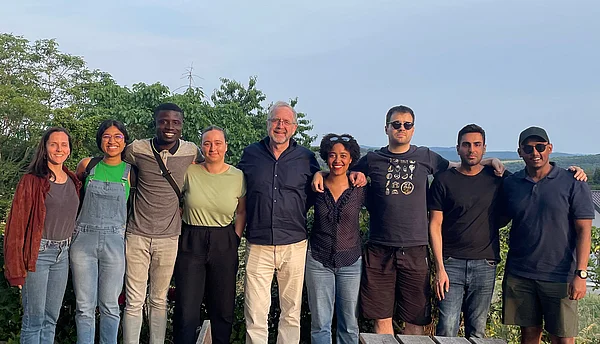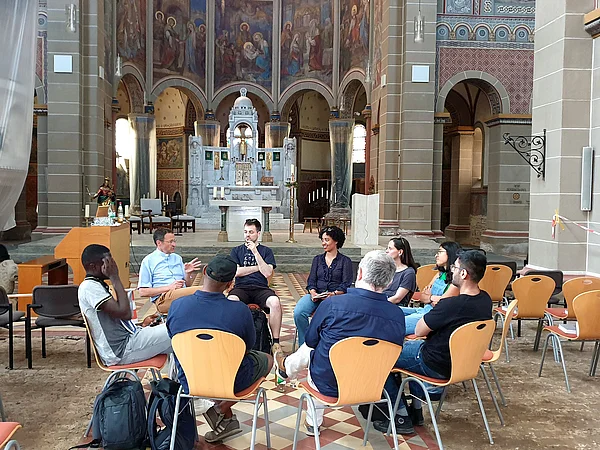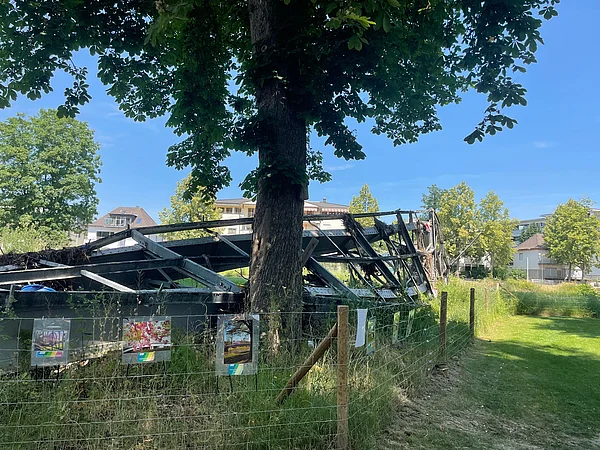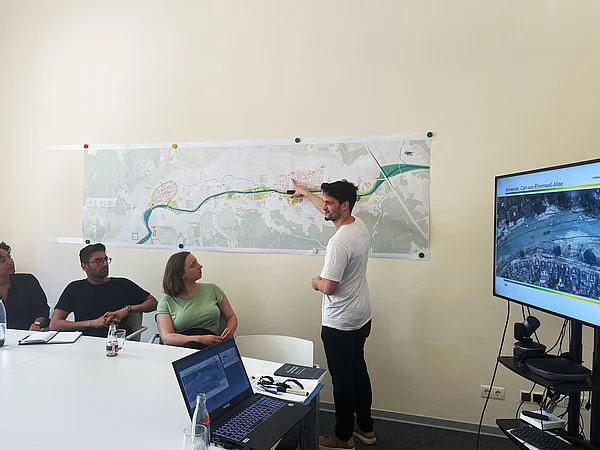„The mud has been long gone. But the catastrophe will stay in the region for a long time“
[Dieser Text ist auch auf Deutsch erschienen / This text has also been published in German.]
The Ahr Valley is known for its beautiful landscape and viticulture. In 2021, however, the region between North Rhine-Westphalia and Rhineland-Palatinate came into focus for completely different reasons: it was hit by a flood disaster that caused considerable damage - the consequences are still visible today and many of those affected have not recovered from the flood even after more than two years. In this field report, students Lea von Dömming and Sami Gerezghiher take us to the Ahr Valley. In a seminar at the University of Witten/Herdecke dealing with the political consequences of global climate change, they visited the region to see the different aspects of reconstruction. They analyzed political dealings, looked at the economic perspective, and also addressed issues of justice.
In our Philosophy, Politics, and Economics course, we analyze the consequences of climate change - politically, economically, and philosophically - so we also looked at the 2021 floods in North Rhine-Westphalia and Rhineland-Palatinate. Accompanied by political scientist Prof. Dr. Reinhard Loske, we traveled to the Ahr Valley near Bonn. Prof. Loske has been dealing with climate policy for years and was a member of the German Bundestag from 1998 to 2007. During our visit (to the Ahr Valley), the focus was on conversations with different people who experienced the flood and are still intensively dealing with it in their roles today.
For example, there is Maximilian Kranich from the Aufbau- und Entwicklungsgesellschaft Bad Neuenahr-Ahrweiler mbH. He presented the endeavors of one of the most affected cities in the region to rebuild resilient public infrastructure. There are many challenges, stakeholders, and interests to consider. Although there is a lot of money, unlocking the money for projects is a constant struggle. One of the crucial questions: Should we rebuild what was before or build back better?
When cohesion crumbles
To explore the psychological and social impact of the events, our trip took us to the town's church and its welcoming and spirited local priest, Jörg Meyerer. He told about the residents of the region who lived their solidarity during the crises by working together and eating together. The immediate effect of the flood was literally and figuratively that there were no walls and fences in town: "You didn't need money, everything was shared." However, in time, the social cohesion crumbled, and two years later, inequalities in financial, psychological, and social resources show their effect. We could see the different experiences of people in the town of Bad Neuenahr: Some facades look shiny and new, while others have been left broken ever since.
The private building projects are managed by local architects like Udo Heimermann, who showed us one of his large projects. While the front of the residential house looked perfectly normal, the apartment behind it had everything but the walls removed. Heimermann told us passionately about the unique struggle to work on a multitude of projects, each with its own financial and construction challenges.
"Through the exchange with people in the area and seeing the flood's remainder, one of my key takeaways is the high importance of psychological “reconstruction” in addition to physical reconstruction. This made the need to develop an agency for climate protection even more real to me. Especially because the crisis is globally interconnected and in the Ahr Valley case, it seemed to me that it shrinks your own horizon from a worldwide perspective to a very local one, focusing on the event in front of you. What made the PPE seminar so special, were the different perspectives from the people on the ground but also of our classmates. Taking all of this into consideration, I’ll use that experience to foster conversations about solutions and the global scale of climate protection." - Louisa Duesman, PPE student
Solidarity everywhere
A drive from there, up top in the hills of the region, is the headquarters of the Helfer-Stab organization, a non-profit founded to support the recovery and rebuilding measures following the floods. Edna Wiechers from the Helfer-Stab, or "helping staff," and her partner provided us with a first-hand description of the events in July 2021. The solidarity between the people of the region was also visible here with the large number of people who supported the relief and rescue initiatives. The efforts of the volunteers, although chaotic at times due to the lack of preparation and organization, were irreplaceable, for example, in removing the masses of mud and debris. While, at first, the Helfer-Stab coordinated the spontaneous volunteers and donations, they now focus on communicating the numerous offers of help to the people in need.
"I am glad that we were able to have an excursion and talk to local authorities because we were able to see limitations and the continuous struggles that affected people are going through to rebuild what they have lost within and despite the help that was given." - Milad Mosalanejad, PPE student
Mutual learning
After a long and exhausting day in the beautiful Ahr Valley, we drove back to Witten with mixed feelings. On the one hand we were very moved by the emotionality, the solidarity and the strength of the people, on the other hand we can see here the pain that more and more people will have to go through in the near future because of climate change. One thing became especially clear on our trip: the mud is long gone. But the catastrophe will stay in the region for a long time.
On the last day of the seminar, we looked again at the academic perspective and what we can learn for future disasters worldwide from this example. Some of our fellow students were able to report on flood disasters they had experienced themselves, and the similarity of the challenges were astonishing. This makes it all the more important that we learn from each other.
"The “PPE in Practice” seminar holds true to its name and successfully helped us to understand the practical challenges that come up when adapting to climate change. My favourite part were all the discussions we had with professionals from the field and I also appreciated Prof. Loske encouraging us all to go beyond the political and economic aspects, and delve into the philosophical underpinnings of facing the consequences of climate change!" - Angela John, PPE student
authors: Lea von Dömming, Sami Gerezghiher
pictures: Angela John, Lea von Dömming



